#Billie Holiday Strange Fruit
Text
Billie Holiday - Strange Fruit
Billie Holiday – Strange Fruit
Strange Fruit
What Is It?
The song Strange Fruit by the American Jazz & Swing singer Billie Holiday (Lady Day).
Strange Fruit
Here is how Wikipedia describes this song:
“Strange Fruit” is a song written and composed by Lewis Allan and recorded by Billie Holiday in 1939. The lyrics were drawn from a poem by Meeropol published in 1937. The song protests the lynching of Black Americans with…

View On WordPress
#African American#Billie Holiday#Billie Holiday Strange Fruit#Black#Extra Credits#Fine And Mellow#Hanging#Lewis Allan#Lynching#Music#Race#Racism#Strange Fruit#Video
0 notes
Text
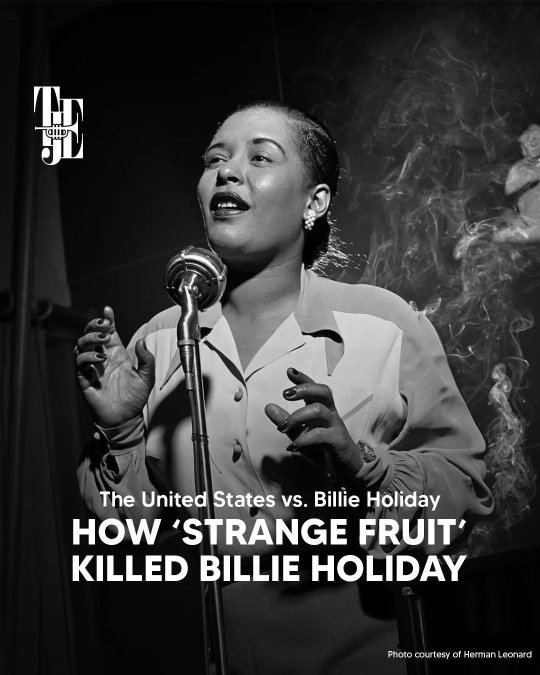
Billie Holiday, Strange Fruit
53 notes
·
View notes
Video
Happy heavenly birthday to one of the most influential jazz singers of all time, Ms. Billie Holiday ✨
Holiday is most known for her 1939 song “Strange Fruit,” a powerful piece about the lynching of Black Americans in the South. She was posthumously awarded the Grammy Lifetime Achievement Award in 1987, and TIME named “Strange Fruit” the Song of the Century in 1999.
Video credit: Reelin’ In The Years Archives
20 notes
·
View notes
Video
youtube
Billie Holiday - "Strange Fruit" Live 1959 [Reelin' In The Years Archives]
23 notes
·
View notes
Text
Okay, I finally watched The United States vs Billie Holiday. Ohhh my chest 😩😩😩 it fn hurts 😩😩😩 that poor woman 😭😭😭😭
I gotta applaud yall though. As much as yall praised Trevante Rhodes, not nary a one of you spoiled how toxic he is. I love yall frfr 😩
Deff dont know I slept well after that movie
#megamind be watching#the united states vs billie holiday#am baby#cried my fn eyes out#so damn sad#strange fruit always been a visceral bop
18 notes
·
View notes
Text
Eddie ruffles through Steve's glove box and finds a cassette labeled BANNED SONGS and thinks "don't mind if I do~" before shoving it in the player without looking at the tracklist.
Olivia Newton John's Physical blares through the speakers, already halfway done. Steve laughs but doesn't say anything.
It fades out and the next song starts with a weird sort of clicking noise, and sounds sort of snyth popfunk? Eddie isn't really sure. He lets it play out, anti-reagan sentiment and condemnation of fascism behind the synth. Its. Unique. He kinda digs it though. He listens for the next song and- Loretta fuckin Lynn?
"Steve. what the fuck."
Steve's mouthing along, tapping the beat on the steering wheel. He grins. "It's my banned songs tape. All of em have been censored in some way or another. Listen!" He turns it up, and, Loretta Lynn is singing, in her charming Appalachian drawl, about how she's not having any more kids, how she's getting her life back and not going to be pregnant constantly because she's got birth control. How she's going to have fun.
The song ends with a beat of silence, and trumpet bleeds with piano with the white noise of an old recording transfer from a record, and Billie Holiday sings mournfully, filling the car with the pain in her voice.
It trails out, the soft sound of a record not quite finished after the song, and then there's a drumbeat, strong, on the next one. Eddie finally checks the carefully written tracklist on the inside of Steve's little homemade cover.
"Redbone? The--the 'come and get your love' guys?"
Steve nods. "The lyrics, Eddie." And oh. Oh it's about Native Americans getting killed by the army. Shit.
"yeah. Some of em are heavy, some of em just talk about sex. Or god." He smirks.
It fades out, and the goddamn Beach Boys come on.
"are you serious?"
Steve laughs again.
"what made you make this?"
He shrugs, "after it all came back, in '84, I was. Messed up. Nance and I had broken up and she'd gotten with Jonathan, I was suuuper concussed, and these government goons were giving me the third fucking degree even though it was all their fault it happened in the first place and they hadn't done shit to stop it. I already had the Redbone album" he ignores Eddie's muttered of course you did "so I thought, fuck it. I can't do much but I can listen to things they don't want me to. So, yeah."
Freddie Mercury croons, and they both laugh.
#steddie#steve harrington#eddie munson#stranger things#all these songs were banned in some way before 1985 :)#the songs listed in order are: physical. (we don't need this) fascist groove thang by heaven17.#the pill by loretta lynn. strange fruit by billie holiday. we were all wounded at wounded knee by redbone.#god only knows by the beach boys. i want to break free by queen#i highly recommend the redbone and loretta lynn ones. so good.#finda writes stuff#finda's rambles#fics#steve is like fuck the government im gonna listen to music they dont wamt me to bc i cant do anything about how my town is cursed
278 notes
·
View notes
Photo




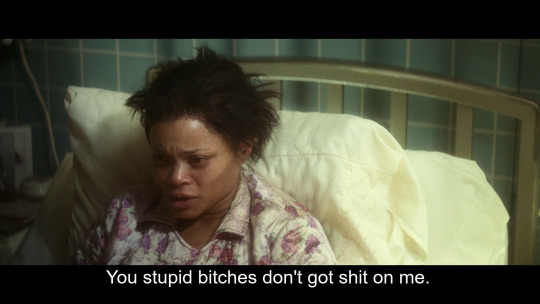

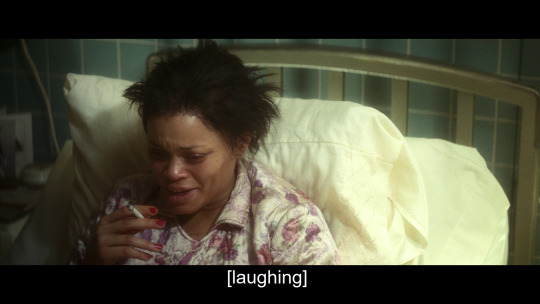

my favorite moment in a film this year, the terrific Andra Day as Billie Holiday defying Harry J. Anslinger (Commissioner of the Federal Bureau of Narcotics) Strange Fruit is about lynching/racism and the establishment did everything to stop her from performing it. The importance of the song and what Billie represented is immeasurable.
92 notes
·
View notes
Text
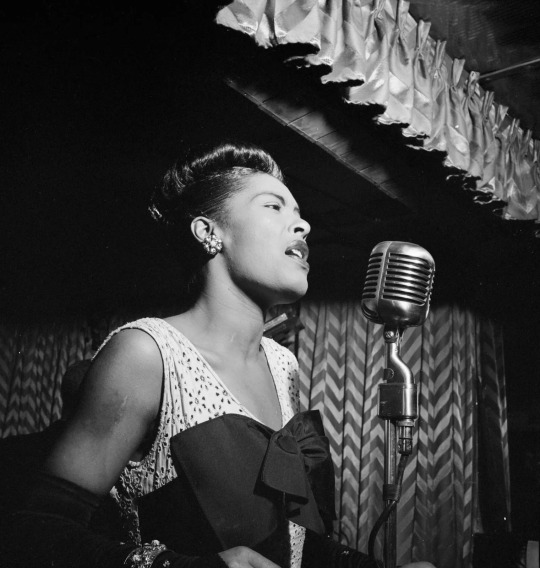

"Strange Fruit" was originally a poem written by Jewish-American writer, teacher and songwriter Abel Meeropol, under his pseudonym Lewis Allan, as a protest against lynchings and later set it to music.
First performed by Meeropol's wife and their friends in social contexts, his protest song gained a certain success in and around New York.
The song soon came to Billie Holiday's attention, and after so many frequent requests of that song, she closed out every performance with it. The waiters would stop serving ahead of time for complete silence, the room would darken, a spotlight would shine on Holiday's face, and there would be no encore radio stations in the South wouldn't play it, record labels wouldn't record it, and yet the song rose in the charts selling over one million copies.
Despite the success, a government agency was determined to shut her down. One night in 1939, Holiday received a warning from the Federal Bureau of Narcotics to never sing the song again. This order was led by FBN commissioner Harry Anslinger, also known as an "extreme racist in the 1920's".
He had a mission to eradicate all drugs everywhere, and believed jazz music was the problem. His attack on this genre of music was racially led.
Holiday's known struggles with alcohol, drugs, and vocal voice against white supremacy made her a target. He sent undercover agents after her, including arranging for her abusive husband to set her up.
She was put on trial (The United States of America vs. Billie Holiday) just wanting to recover, but was sent to prison and her cabaret license was revoked. That didn't keep her down. She continue to perform "Strange Fruit" even at a sold out show at Carnegie Hall.
In 1959, Holiday collapsed and was sent to the hospital with liver disease and goes into heroin withdrawal. Her friend managed to have the hospital give her methadone to help her recover.
Arslinger's team arrested her on her hospital bed cutting off her methadone medication after claiming to have found heroin in her bedroom. 10 days later, Holiday died.
•••
“Strange Fruit” (Fruto Extraño) originalmente fue un poema escrito por un escritor, profesor y compositor judío-estadounidense llamado Abel Meeropol, bajo su seudónimo Lewis Allan, como una protesta en contra de los linchamientos y luego se convirtió en musica.
Primero fue interpretada por la esposa y los amigos de Meeropol, más que nada en contextos sociales. Su canción de protesta ganó cierto éxito en los alrededores de Nueva York.
Pronto la canción le llamó la atención a Billie Holiday y después de recibir tantas solicitudes para esta canción, era con esta que cerraba cada una de sus presentaciones. Los meseros dejaban de atender las mesas antes de tiempo para que hubiera completo silencio, la habitación se oscurecía y una luz alumbraba la cara de Holiday. No había ni una sola estación de radio en el sur que no reprodujera la canción, las disqueras no querían grabarla pero aún así la canción subío de posición en las carteleras, vendiendo alrededor de un millón de copias.
A pesar del éxito, había una agencia gubernamental que estaba determinada a callarla . Una noche en 1939, Holiday recibió una advertencia por parte de la Oficina Federal de Narcóticos, le dijeron que jamás volviera a cantar esa canción. Esta orden estaba siendo dirigida por el Comisionado Harry Anslinger, también conocido como “un racista extremista de los 1920”.
Tenía la misión de erradicar todas las drogas en todos lados y creía que la música jazz era el problema. Su ataque a este género musical fue racialmente dirigido.
Las conocidas luchas que Holiday tenía con el alcohol y las drogas, y el uso de su voz contra la supremacía blanca la convirtieron en un objetivo. Envió agentes encubiertos tras ella, incluso haciendo arreglos para que su esposo abusivo le tendiera trampas.
Fue llevada a juicio (Los Estados Unidos de América vs. Billie Holiday) cuando lo único que que quería era recuperarse, pero fue enviada a prisión y le quitaron su licencia de cabaret, pero eso no la detuvo. Siguió cantando Strange Fruit (Fruto Extraño), agotando los boletos para su presentación en Carnegie Hall.
En 1959, Holiday colapsó y fue enviada al hospital con enfermedad hepática y entró en abstinencia por heroína. Una de sus amigas logró hacer que el hospital le diera metadona para ayudarle a recuperarse.
El equipo de Anslinger la arrestó en su cama de hospital, le cortaron su medicamento, metadona, afirmando que habían encontrado heroína en la habitación. 10 días después, Holiday falleció.

#blacklivesmatter#blacklivesalwaysmatter#english#spanish#blackhistory#history#share#read#blackpeoplematter#blackhistorymonth#blackhistoryyear#billie holiday#strange fruit#black history is american history#culture#knowyourhistory#like#follow#historyfacts#blackgirlmagic#blackmusicmatters#black music#jazz#blues#music genres#blackbloggers#no justice no peace#spotify#musicians#music
77 notes
·
View notes
Text

Southern trees bear a strange fruit
Blood on the leaves and blood at the root
Black bodies swinging in the Southern breeze
Strange fruit hanging from the poplar trees
Pastoral scene of the gallant South
The bulging eyes and the twisted mouth
Scent of magnolias, sweet and fresh
Then the sudden smell of burning flesh
Here is a fruit for the crows to pluck
For the rain to gather, for the wind to suck
For the sun to rot, for the tree to drop
Here is a strange and bitter crop
- “Strange Fruit”, Billie Holiday
5 notes
·
View notes
Text
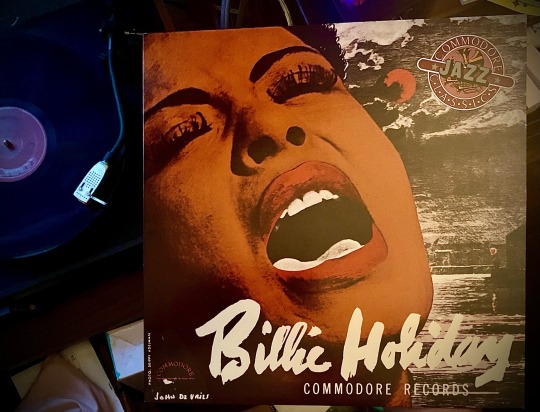
It’s been awhile for a random vinyl shelf pull…
Billie Holiday “Commodore Classics (1939-1944)” 1988
I’m 1939 Billie Holiday had an amazing song in “Strange Fruit” but her label at the time, Columbia, wouldn’t let her record it. They felt it was too controversial so they allowed her to record it for independent label Commodore Records. Turned out to be the most important recording of her career. Probably of anyone’s! The rest of the album is mostly slow standards (but there’s a couple of uptempo tracks in there).
16 notes
·
View notes
Text
#Billie Holiday#jazz music#louis armstrong#women in music#donna summer#ella fitzgerald#Strange Fruit#art#legend#model#luxury#design#Icon#incredible#amazing#talent#song#music#artistry#artists#all time great#IndeedGoodMan#message#fyp#tumblr#for you page
6 notes
·
View notes
Text
Billie Holiday Vs The US Government - Extra History
Billie Holiday Vs The US Government – Extra History
Billie Holiday Vs The US Government – Extra History
What Is It?
The YouTube video Billie Holiday Vs The US Government – Extra History by the YouTube channel Extra Credits.
Here is the description for this video:
—- To learn more about Brilliant, go to https://brilliant.org/ExtraCredits/ and sign up for free. And also, the first 200 people that go to that link will get 20% off the annual…

View On WordPress
#Addiction#Billie Holiday#Billie Holiday Strange Fruit#Billie Holiday Vs The US Government - Extra History#Extra Credits#FBI#Government#History#Music#Race#Racism#Strange Fruit#United States#Video
0 notes
Text
Song of the Day as we round out Black History Month 2024
3 notes
·
View notes
Text

Billie Holiday performing “Strange Fruit” in NYC’s first integrated club, 1939 - Photo by Gjon Mili/Colorized by Jared Anderson (via twitter)
67 notes
·
View notes
Text

#Billie Holiday performing “Strange Fruit” in NYC’s first integrated club#1939 - Photo by Gjon Mili/Colorized by Jared Anderson#ManuelHarrisju#oldschool
61 notes
·
View notes
Text

It was only 97 words, he was proud of what he wrote, but he was always uneasy about it, even after he set it to music in November of 1938.
He “was the child of Jewish immigrants who had fled pogroms in Russia [which is now Western Ukraine], and his activism was inspired by his family's history facing antisemitic violence and hatred,” according to Experiencing History.
Until the day he died at the age of 83 on October 29, 1986, he remained haunted by the image.
When he first saw the picture, he was revulsed by the gruesome image.
“The image is one most Americans would prefer to forget: Two black men, beaten and bloodied, hang from an elm tree . . . A white crowd mills around beneath them, and in the foreground a man glares at the camera, pointing back at one of the bodies,” wrote Frederick H. Lowe of the Chicago Reader.
“Woven into the fabric of racially-motivated violence in America is a summer night in Marion, Indiana in 1930,” wrote Nicole Poletika of the history blog.
It was August 7, 1930, the night 18-year-old Thomas Shipp and 19-year-old Abram Smith were lynched in Marion, Indiana, wrote Lowe.
“Local photographer Lawrence Beitler took a photograph of the swinging bodies, capturing a white crowd that looked on in a mixture of satisfaction, hostility, amusement, and bewilderment,” wrote Poletika. “This photo was reproduced on postcards and circulated by the thousands.”
“The police department did not protect Thomas and Abram from the bestial mob, and they never arrested or convicted anyone in the crowd,” according to Stanford Libraries. “The photographer sold thousands of copies because souvenirs from lynchings were a hot commodity.”
A Jewish American public high school teacher in New York City saw the photograph, which disturbed him so much that he wrote those 97 words.
It was published in 1937 in The New York Teacher, the journal of the teachers union. He set those 97 words to music in November of 1938, then shared his song with a singer at the Cafe Society night club in New York City’s Greenwich Village.
The singer was Billie Holiday, the poem formerly titled “Bitter Fruit” was now “Strange Fruit”.
The teacher who wrote those 97 words was Abel Meeropol.
This is a new story from the Jon S. Randal Peace Page, focusing on past and present stories seldom told of lives forgotten, ignored, or dismissed. The stories are gathered from writers, journalists, and historians to share awareness and foster understanding.
~~~~~
Meeropol’s son Robert wrote:
“My father Abel Meeropol was born in The Bronx in 1903 and grew up there. He was the son of Jewish immigrants, who just before his birth fled the anti-Semitic pogroms of what is now Western Ukraine. He told me that as a child he loved animals and abhorred violence. He had a dog named Sporty. He used the dog and his wits to avoid fights. He’d tell the other kid that he’d fight, but would first have to take his dog home. Then he’d leave, and never return.”
Meeropol “was a graduate of City College in 1925, with a master of arts degree from Harvard in 1926,” according to the New York Times. “He taught English at DeWitt Clinton High School in the Bronx from 1927 to 1944, when he turned to music full time.”
He started writing “for the stage, screen, radio and television, under the pen name of Lewis Allan,” according to the Times.
After Meeropol set “Strange Fruit” to music, his wife, Anne, would sing and play it on her nylon string guitar at Teachers’ Union events.
The founder of the Café Society nightclub had heard Meeropol perform his song and asked him to play it for Holiday, who was the club's headline performer at the time.
“At first, Holiday was hesitant to sing it,” according to Experiencing History. “She worried that the customers at the nightclub came simply to be entertained and would not be receptive to a political song. She also worried about becoming a target of racist aggression and violence herself. But the audience response at Café Society was thunderous, and Holiday soon embraced the song as her own.”
“The song caused a sensation,” wrote Meeropol’s son.
“During this period [Meeropol] was subpoenaed by the Rapp-Coudert Committee, a group set up the State Legislature to investigate teachers said to have participated in Communist activities,” according to the New York Times.
Lowe writes:
“According to Cynthia Wilson, archivist at Tuskegee University, 4,742 people were lynched in the U.S. between 1882 and 1964–3,445 of them black. “Mobs lynch someone whom they accuse of committing a crime,” says Wilson. “Or they lynch someone whom they accuse of violating a southern tradition.” Rubin Stacy, lynched July 19, 1935, in Fort Lauderdale, had been accused of “frightening and threatening a white woman.”
~~~~~
“Abel left teaching to avoid being fired for his politics and went to Hollywood to write full time,” according to his son. “In 1944 Abel wrote his other famous song, ‘The House I Live In.’ Abel wrote the lyrics and his friend Earl Robinson wrote the music. In 1945, Frank Sinatra performed it in a short film, which won an Academy Award in 1946. Abel and Anne attended a screening of the film at a local theater. When Abel realized his anti-segregation verse had been cut from the film he was furious. He started yelling in the theater “Shit, shit, they ruined my song!” He was physically ejected. Abel came back to New York City one step ahead of the Hollywood blacklist to write for television.”
The censored verse was:
“The house I live,
My neighbors white and black,
The people who just came here,
Or from generations back.
The town hall and the soapbox,
The torch of liberty,
A home for all God’s children.
That’s America to me.”
Meeropol is also known for adopting the sons of Julius and Ethel Rosenberg, Robert and Michael Rosenberg after their parents' execution in 1953, according to the New York Times. The Meeropols adopted the boys in 1957.
His son, Robert Meeropol writes:
“In 1953, after the execution of my birth parents, Ethel and Julius Rosenberg, Abel and Anne adopted my brother Michael and me. This act showed that the man who wrote ‘Strange Fruit’ not only fought lynching with words, but also fought against it with his heart by adopting the sons of a couple he believed had been lynched by our government.
“My brother and I had been traumatized by the arrest, trial and execution of our parents. We’d been shunned by relatives, placed in a shelter, shuffled around among friends and even thrown out of the New Jersey public school system.
“But we thrived under Abel and Anne’s shelter, stability and love.”
~~~~~
“Billie [Holiday continued performing] [“Strange Fruit”] as her last number of the evening,” according to Robert Meeropol. “All service was stopped while she sang so that there would be silence. When she finished, the stage lights were extinguished for dramatic effect. According to reports, the audience was so stunned at the end of her first performance that no one made a sound.”
Sting performed the song on an album celebrating Amnesty International’s 25th anniversary in 1986. In 2000, Time Magazine named it the “song of the century.” The song has also been performed by Diana Ross, Nina Simone, and Andra Day.
Abel Meeropol died of pnuemonia on October 29, 1986 at the Jewish Nursing Home in Longmeadow, Mass. He was 83 years old and had lived in South Miami, Fla., before entering the nursing home, according to the New York Times.
~~~~~
When Frank Sinatra sang ''The House I Live In'' as part of the 100th birthday celebration for the Statue of Liberty [which had been dedicated on October 28, 1886] in a letter to The Times, Robert and Michael Meeropol expressed their pride in hearing their father’s song.
“What is America to me?
A name, a map, a flag I see
A certain word, democracy
What is America to me?
The house I live in
A plot of earth, a street
The grocer and the butcher
And the people that I meet
The children in the playground
The faces that I see
All races and religions
That's America to me
A place I work in
A worker by my side
A little town or city
Where my people lived and died
The howdy and the handshake
The air of feeling free
And the right to speak my mind out
That's America to me.”
''We hope that 'The House I Live In' will serve to remind all Americans that patriotism is not limited to the right wing,'' the letter read. ''We hope our father's life and work can help convince people to view with suspicion anyone who would curtail political freedom and limit the range of acceptable politcal debate in the name of anti-Communism, of anti-terrorism or of some 'higher' morality.''
Of his other song, Meeropol once said, "I wrote Strange Fruit because I hate lynching and I hate injustice and I hate the people who perpetrate it."
His son, Robert writes:
“Over 80 years after Abel wrote those 97 potent words . . . the pot is in full boil. The song’s growing power gives me hope. The pen just could be mightier than the sword after all.”
~ jsr
The Jon S. Randal Peace Page
32 notes
·
View notes